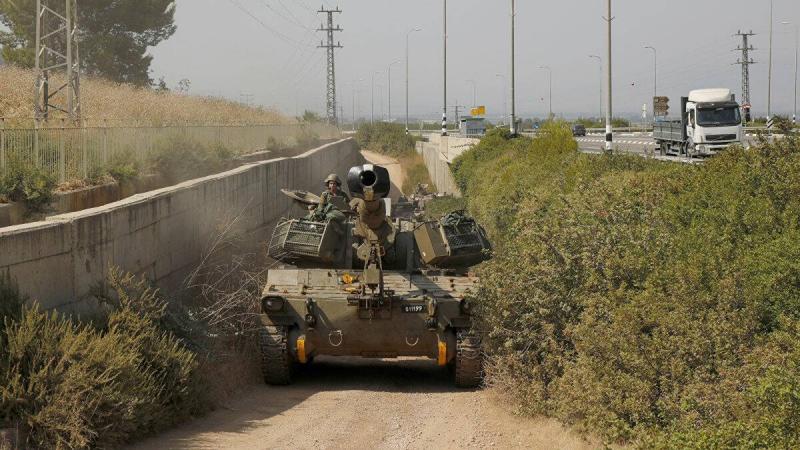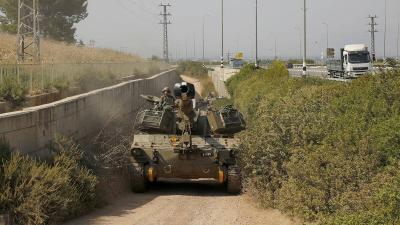CNN reported that in March, senior U.S. officials expressed concern that Israel is planning a ground incursion into Lebanon. Sources estimated that such an invasion could begin soon if diplomatic efforts fail to persuade Hezbollah to retreat from the northern border with Israel. Since October 8, Hezbollah and Israel have been exchanging fire almost daily, following Hezbollah's opening of a southern Lebanon front as a "support and backup" for Hamas in Gaza.
Despite Israeli threats of a ground invasion of southern Lebanon, military analyst and retired Brigadier General Ya’arab Sakher believes Israel will only proceed if the land is scorched, as Israel can achieve its goals from the air by targeting lower and higher-ranking Hezbollah members and hitting leadership and control centers while disrupting logistical supply lines for Iranian militias wherever they may be. Sakher noted that in early October, the U.S. expressed its readiness to protect Israel’s security, which silenced Iran and its allies. However, as the U.S. confirmed its stance to avoid escalation and further conflict in the region, and due to Israel's adaptation to the U.S. administration's decision to limit the provision of advanced weapons for major operations, Iran intensified its rhetoric and claims, exploiting the situation to strengthen its influence.
He pointed out that the U.S. is currently focused on presidential elections, which may impact the region's dynamics, suggesting that Republican candidate Donald Trump's chances of winning have increased, especially following a failed assassination attempt against him, while Democratic candidate Joe Biden's prospects have diminished. The return of Republicans to power would mean a tougher and firmer American stance and a different Middle East.
Sakher emphasized that the upcoming period until the end of the year will be decisive, and that Israel "will exploit" American preoccupations to rally congressional support for the release of necessary military supplies for a significant military operation in Lebanon, which it still intends to undertake, with signs of this escalating gradually. Israel is currently demanding that Hezbollah implement UN Security Council Resolution 1701, which ended the July 2006 war, requiring Hezbollah fighters to withdraw to the southern Litani River and establish a buffer zone patrolled by the Lebanese Army and the UN Interim Force in Lebanon (UNIFIL).
## Israeli Preparations Above and Below Ground
Meanwhile, Israel is preparing for what could be another war in the north against Hezbollah as it readies itself above and below ground, according to a report from The Wall Street Journal. Heavily fortified buildings are being prepared, including underground facilities at Rambam Healthcare Campus, which will house operating rooms, a maternity ward, and a dialysis center in parking garage levels. Medical staff are being trained for rapid evacuation to these areas. Dr. Michael Halberthal, director of Rambam Healthcare Campus, stated, "We expect thousands of casualties here... this is what we are prepared for."
The report indicates that healthcare centers in northern Israel are preparing for a war that could exceed the damages of the ongoing conflict with Hamas, as Hezbollah is better organized and equipped compared to Hamas, with experts estimating its missile stockpile at around 150,000 projectiles capable of causing substantial damage. If a war breaks out between Hezbollah and Israel, relief workers and mayors briefed by the Israeli Army anticipate approximately 4,000 rockets targeting Israeli towns daily, which could overwhelm air defense systems, potentially leading to fires and infrastructure destruction.
Casualties in Lebanon are also expected to be extensive, as Israeli Defense Minister Gallant threatened in statements earlier this year that the Israeli military could "copy" what is happening in Gaza and repeat it in Beirut.
## Difficult Decision
Lebanese military and strategic expert, retired Brigadier General Naji Malaeb, believes the internal situation in Israel makes it challenging for Netanyahu's government to decide on a ground invasion of Lebanon, citing several factors, notably leaked information from the Israeli Army regarding a shortage of tanks and preparations by Hezbollah for such a scenario. He pointed out that "Hezbollah managed to destroy 72 Merkava 3 tanks in one day in Wadi al-Hujair in 2006, and now the party possesses developed Kornet missiles and effective anti-tank missiles."
Malaeb stated, “A ground invasion is difficult,” whether due to Hezbollah's preparations or current Israeli capacity shortfalls. The necessity for the Israeli army to recruit haredim despite their negative stance and protests against it indicates a pressing need for military personnel and a loss of morale for combat. He emphasizes that the situation in Lebanon is vastly different from Gaza, where the Israeli army can enter any street or area; in Lebanon, preparations are more extensive and the front is open beyond Hezbollah.
Hezbollah possesses a massive arsenal of weapons, which may have evolved and expanded over the years, although its exact size is not known. It has announced on multiple occasions that it has developed weapons and various missiles capable of reaching deep into Israel. An official in the Iranian Quds Force overseeing Hezbollah and other Iranian-linked factions in the Middle East stated that "the party has more than a million rockets of various types, including precision-guided missiles and upgraded Katyushas for increased accuracy, along with anti-tank missiles."
## Hezbollah's Military Arsenal
For over six months, Hezbollah and Israel have exchanged fire across the border amid the war between Israel and Hamas, highlighting Hezbollah's military arsenal supported by Iran. This arsenal includes drones loaded with explosives, other drones equipped with Russian-made missiles for aerial attacks from within Israeli territory, as well as an Iranian missile type called "Almas," which has a camera inspired by the Israeli Spike missile.
According to the report, if a ground invasion scenario occurs, Israel has "immense air power capable of destruction, as it did in Gaza," while Hezbollah retains its long-range and medium-range missiles for use in the event of a ground incursion or comprehensive destruction. Despite Israel’s capability to destroy targets up to 120 km from the front, Hezbollah can launch 150 missiles in one batch after nine months, indicating that aerial destruction has not achieved decisive results on the front.
The British magazine The Economist published a report in early July speculating on a potential war scenario between Israel and Hezbollah, suggesting that should war break out, it would involve intense attacks using explosive drones, persistent power outages, and the largest rocket bombardment in history. The report notes that if Israel decides to wage a war targeting Hezbollah to push it northward, this may involve a limited ground invasion of southern Lebanon, an area that Israeli forces occupied until 2000.
It is noted that in 1982, Israeli forces invaded Lebanon, laying siege to Beirut to expel the Palestine Liberation Organization led by the late President Yasser Arafat; however, the departure of Palestinian militants led to the emergence of another Israeli adversary, Hezbollah. In 2006, Israel and Hezbollah engaged in a 33-day war where Hezbollah utilized hundreds of anti-tank weapons to repel Israeli armored assaults, with Israeli air forces targeting approximately 100 objectives daily. Today, the report indicates that "Israeli military leaders boast that they can strike over 3,000 targets in a single day."
As threats between Hezbollah and Israel escalate, competition intensifies between diplomatic efforts and military solutions, leaving the question: who will prevail first in this crucial race?




